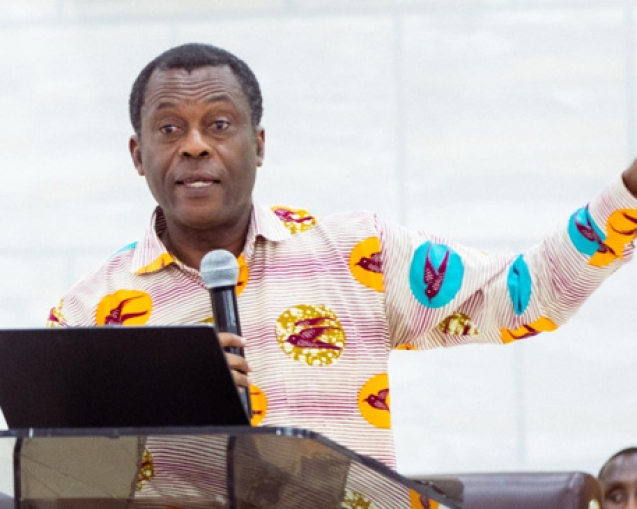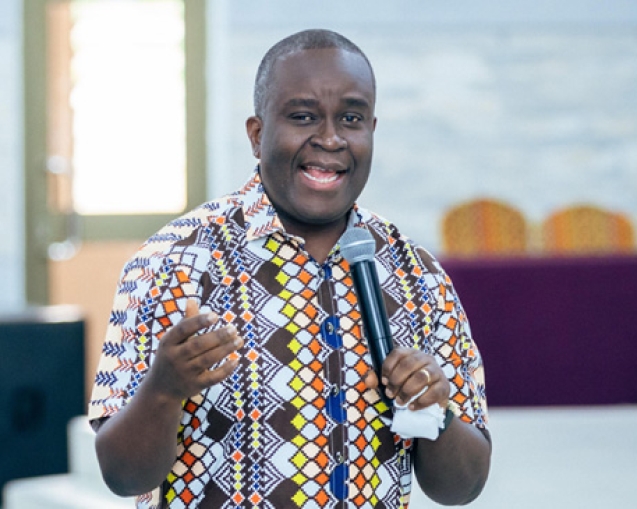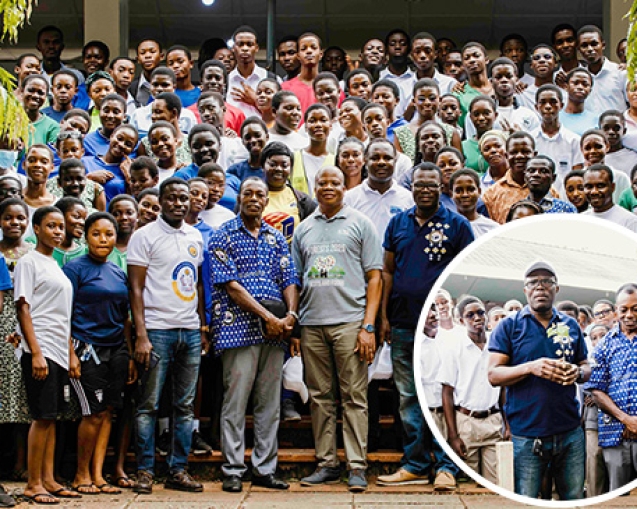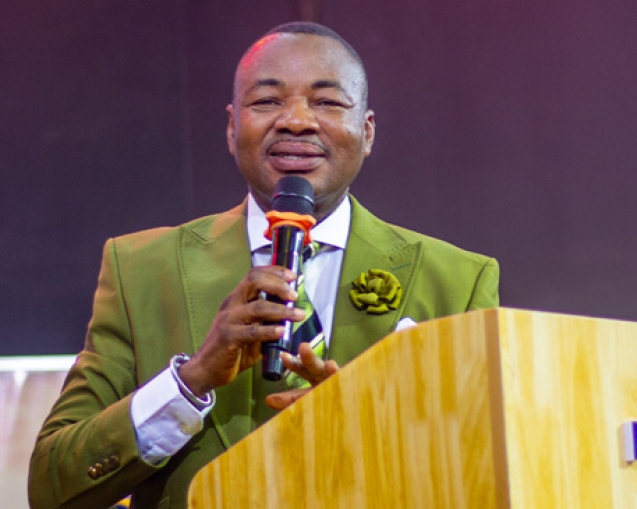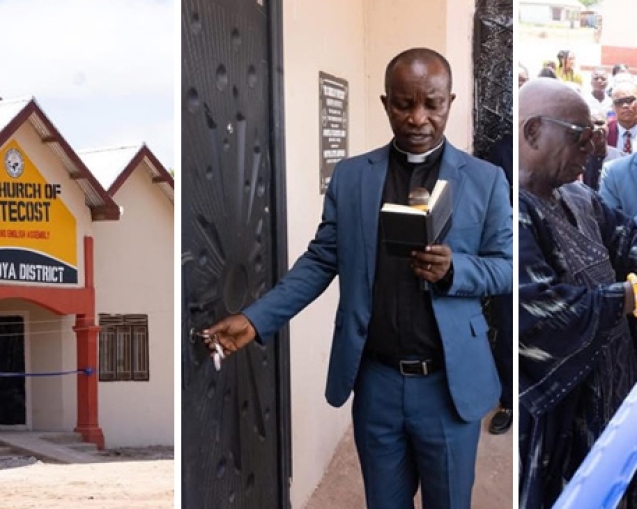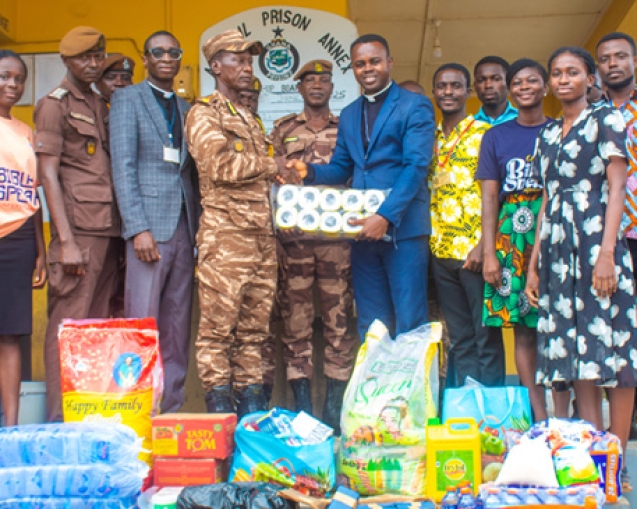In today’s rapidly changing world, urban centres serve as epicentres of cultural diversity and dynamic social interactions. As populations become increasingly heterogeneous, the need for churches to adapt and embrace multiculturalism and multigenerational engagement becomes paramount. Through an in-depth examination of scriptural foundations, the dynamics of city life, and the implementation of organizational and spiritual principles, this article explores the significance of building tomorrow’s church today by fostering diversity and unity within city/metro churches, drawing insights from biblical principles, characteristics of urban environments, and practical strategies for effective ministry without compromising on church values and doctrines.
THE GLOBAL IMPACT OF THE CHURCH OF PENTECOST
The Church of Pentecost, originating from Ghana, has experienced remarkable growth and expansion, spreading its influence to over 150 countries worldwide. This article explores the significance of multiculturalism, generational dynamics, and technological trends within the context of the Church of Pentecost’s global outreach.
MULTICULTURALISM & MULTIGENERATLIZATION
“There is neither Jew nor Gentile, neither slave nor free, nor is there male and female, for you are all one in Christ Jesus.” (Galatians 3:28)
MULTICULTURALISM
Multiculturalism refers to the coexistence and interaction of diverse cultural groups within a society or community. It recognizes and values the cultural diversity present in a given population, including differences in ethnicity, nationality, language, religion, and customs.
Multiculturalism promotes the idea of mutual respect, tolerance, and understanding among different cultural groups, fostering social cohesion and inclusivity. It encourages individuals to celebrate their cultural heritage while also embracing and learning from the traditions and perspectives of others. Multiculturalism aims to create environments where people from various backgrounds can live harmoniously and contribute to the richness and vibrancy of society.
MULTIGENERATIONALISM
“One generation commends your works to another; they tell of your mighty acts. (Psalms 145:4)”
Multigenerationalism refers to the integration and collaboration of individuals from different age groups within a community or organization. It emphasizes the importance of engaging people of all ages, including children, youth, adults, and seniors, in various aspects of communal life, such as education, work, recreation, and decision-making processes.
Multigenerationalism recognizes the unique contributions, experiences, and perspectives that each generation brings to the table and seeks to foster intergenerational connections and relationships. It promotes opportunities for learning, mentorship, and mutual support across age groups, aiming to create inclusive and supportive environments where individuals of all ages can thrive and contribute to collective wellbeing and growth.
- Here’s a more specific breakdown of the generations with their approximate birth years:
- Silent Generation: Born approximately between 1928 and 1945
- Baby Boomers: Born approximately between 1946 and 1964
- Generation X: Born approximately between 1965 and 1980
- Millennials (Generation Y): Born approximately between 1981 and 1996
- Generation Z: Born approximately between 1997 and 2012
- Generation Alpha: Born approximately from 2013 onwards
BIBLICAL FOUNDATIONS OF MULTICULTURALISM:
Galatians 3:28 emphasizes the unity of believers regardless of ethnicity, socioeconomic status, or gender. It underscores the egalitarian nature of the Christian faith. Psalms 145:4 highlights the intergenerational transmission of faith and the sharing of God’s mighty acts. It emphasizes the importance of passing down spiritual heritage from one generation to another. Nehemiah 8:2-3 illustrates the inclusive nature of worship gatherings, where men, women, and all who could understand were present. It portrays a diverse assembly engaged in the study of God’s Word.
UNDERSTANDING GENERATIONAL TRENDS:
Gen Z and Generation Alpha are characterized by their digital fluency, social connectivity, and distinct values. They are highly influenced by technology and social media. Social media usage statistics among teens underscore the pervasive influence of technology on younger generations. For example, 90% of teens ages 13-17 have used social media, with YouTube, TikTok, Instagram, and Snapchat being among the most popular platforms.
DEMOGRAPHICS OF CHURCH OF PENTECOST MEMBERSHIP:
Analysis of membership demographics reveals significant percentages of children and youth in key regions such as Ghana, the UK, and the USA. In Ghana, children and youth constitute 75.2% of the membership. The Church of Pentecost’s presence in the USA, with a membership of over 35,000, including a notable percentage of non-Ghanaian indigenes, demonstrates its multicultural appeal. Out of this, 7,233 are non-Ghanaian Indigenes, representing 20.28% of the membership.
MULTICULTURALISM AND CHURCH GROWTH:
Multicultural churches have the potential for exponential growth, surpassing homogeneous ones, especially in urban settings. The New Testament model of the church emphasizes inclusivity, respect for diversity, and equal opportunities for worship and service.
Seventy-five percent (75%) of African immigrants to the U.S. come from 12 countries, namely Nigeria, Egypt, Ghana, Ethiopia, South Africa, Kenya, Liberia, Somalia, Morocco, Cape Verde, Sierra Leone and Sudan, based on 2000 census. Current trends, however, indicate that multicultural churches have the potential to grow even more than homogeneous ones, especially in the cities.
CHARACTERISTICS OF AN URBAN ENVIRONMENT
Urban environments present a rich tapestry of diversity, dynamism, and complexity. In this article, we delve into the unique characteristics of urban settings and explore the challenges and opportunities they offer for church ministry. From cultural diversity to the hustle and bustle of city life, urban contexts present both hurdles and avenues for impactful ministry.
CITY:
A city is a large and permanent human settlement characterized by a dense population, infrastructure, economic activities, and social organization. Cities typically serve as centers of commerce, industry, culture, and governance, offering a wide range of amenities and services to residents and visitors. In terms of population, cities can range from smaller urban centers with tens of thousands of inhabitants to larger metropolises with millions of residents.
METRO CITY:
A metro city, short for metropolitan city, refers to a large urban area that encompasses not only the core city but also its surrounding suburbs and satellite towns. Metro cities are characterized by significant population density, extensive infrastructure networks, and diverse economic activities. These areas often serve as regional hubs for business, transportation, education, and cultural exchange, exerting a significant influence on the surrounding regions. In terms of population, metro cities typically have millions of inhabitants, making them some of the most populous and dynamic urban centers in the world.
In today’s globalized world, the mission of spreading the gospel transcends cultural boundaries, emphasizing the importance of multiculturalism and Multigenerationalism in the church. The urgency of the Great Commission necessitates cross-cultural ministry to reach the ends of the earth with the transformative message of Christ. For churches, especially in the West, thriving in mission requires embracing and celebrating cultural diversity to effectively engage with indigenous communities. Ethics within the church do not advocate for cultural conformity but rather aim for transformation into the likeness of Christ. Regardless of cultural background, all Christians are called to embody the mind of Christ and embrace diversity as integral to the body of believers. From the outset, God’s plan for the salvation of humanity has been global, demonstrated through Abraham’s call to be a blessing to the nations (Genesis 12:1-3).
The shift toward multiculturalism within the church was evident during Jesus’ time on earth. His birth, announced by men from the far east, and encounters with individuals like the Canaanite woman and Greeks seeking Him, underscored the universal nature of His message (Matthew 2:1-2, 15:21-28; John 12:20-22). The Day of Pentecost further exemplified this, as people from every nation gathered in Jerusalem, hearing the gospel in their own languages (Acts 2:1-11).
As the bride of Christ, the church comprises individuals from all nations, tribes, and cultures who have embraced faith in Jesus. This diverse congregation reflects the unity and richness of God’s kingdom, as depicted in biblical imagery (Revelation 19:7, 21:2, 9).
In multicultural churches, every person is valued and respected regardless of color or nationality. Such churches provide a space where people from various backgrounds can come together in worship, offering praise to God in unity. Exploring the unique challenges and opportunities presented by city/metro contexts for church ministry.
CULTURAL DIVERSITY:
Urban centres are melting pots of cultures, languages, and traditions. The analysis of urban dynamics reveals a kaleidoscope of diversity, with people from various ethnic, religious, and socioeconomic backgrounds coexisting. Churches in urban settings must navigate this cultural mosaic, embracing inclusivity and fostering a sense of belonging for all members of the community. This entails recognizing and celebrating cultural differences while promoting unity in Christ.
BUSYNESS AND ANONYMITY:
The fast-paced nature of city life often leads to a sense of busyness and anonymity. Individuals in urban environments may feel disconnected from their neighbours and community, leading to social isolation. For churches, addressing the challenges of busyness and anonymity requires intentional efforts to create opportunities for meaningful connections and relationships. This may involve small group gatherings, community outreach initiatives, and pastoral care programs tailored to urban lifestyles.
HETEROGENEITY AND COMPLEXITY:
Urban landscapes are characterized by heterogeneity and complexity, with multiple layers of socioeconomic, political, and cultural dynamics at play. This complexity presents both challenges and opportunities for church ministry. Churches operating in city/metro contexts must adapt to the ever-evolving urban landscape, navigating issues such as gentrification, social inequality, and urban renewal. This calls for innovative approaches to outreach, discipleship, and community engagement that address the unique needs of urban dwellers.
UNDERSTANDING THE CHURCH AS AN ORGANISM & ORGANIZATION; BALANCING SPIRITUAL VITALITY AND ORGANIZATIONAL EFFICIENCY
In the bustling urban landscape, churches stand as beacons of hope and spiritual guidance. However, to effectively minister to the diverse needs of city dwellers, it’s essential to understand the dual nature of the church as both an organism and an organization. We would delve into the conceptualization of the church in these two facets and explores strategies for nurturing spiritual vitality while maintaining organizational efficiency in city churches.
UNDERSTANDING THE CHURCH AS AN ORGANISM:
An organism is a living entity composed of one or more cells that perform various functions necessary for life. Organisms can range from simple single-celled microorganisms to complex multicellular organisms like plants, animals, and humans. They exhibit characteristics such as growth, metabolism, response to stimuli, adaptation to the environment, and reproduction. Organisms can exist in diverse environments, from terrestrial to aquatic, and play integral roles in ecological systems. The church, as an organism, embodies the spiritual lifeblood that sustains its existence. It operates as a spiritual body, with the Holy Spirit permeating every facet of its being. To nurture spiritual vitality, churches must prioritize Spirit-filled Sunday services characterized by impactful sermons, vibrant worship, and fervent prayer.
Additionally, flagship programs designed to enrich the spiritual lives of congregants serve as catalysts for growth and transformation. Moreover, follow-up ministries, led by mature members of the faith, ensure that spiritual growth continues beyond the church walls.
EMBRACING INTEGRATED MINISTRY PARTICIPATION AS AN ORGANISM
Integral to fostering the church as an organism is the concept of integrated ministry participation. By implementing a squad system, churches facilitate the transition of members from passive attendees to active participants in ministry. Various squads, such as Prayer Warriors, security teams, and Bible study leaders, engage members in meaningful service, fostering a sense of ownership and belonging. Furthermore, churches strive to be seeker-friendly environments, embracing diversity and facilitating inclusive worship experiences through interpretation and program guides.
UNDERSTANDING THE CHURCH AS AN ORGANIZATION:
An organization is a structured entity comprising individuals working together toward common goals or objectives. It typically has defined roles, responsibilities, and hierarchies to facilitate coordination and decision-making. Similarly, the church functions as an organization, with members collaborating toward spiritual aims and communal objectives.
It establishes frameworks for governance, leadership, and administration to ensure effective functioning and alignment with its mission. Like an organization, the church employs strategic planning, resource allocation, and operational processes to achieve its purpose and navigate challenges.
While the church operates as a spiritual organism, it also functions as a structured organization, necessitating effective systems and strategies. Modern technologies, such as projectors and live streaming platforms, enhance the reach and accessibility of church services, ensuring that members can engage irrespective of physical location. Leveraging online social media platforms for communication and advertisement further extends the church’s influence within the digital realm.
ENSURING ORGANIZATIONAL EFFICIENCY:
Organizational efficiency is paramount for the effective functioning of the church. Wellcoordinated services, with clear announcements and seamless transitions, enhance the worship experience for congregants. Embracing diverse means of offering collection, including mobile money (MOMO) and other electronic payment methods, streamlines financial transactions and enhances financial stewardship. Additionally, fixed opening and closing times provide structure and predictability, while robust training programs equip worship teams and leaders for excellence in ministry. Consolidating the home cell system fosters community and discipleship, ensuring that every member feels valued and connected.
CULTIVATING CULTURAL SENSITIVITY AND INCLUSIVE WORSHIP ENVIRONMENTS IN CITY CHURCHES
In the dynamic landscape of city churches, leadership development and creating inclusive worship environments are paramount for fostering cultural sensitivity and promoting unity among diverse congregations. This article explores the significance of equipping leaders to navigate cultural diversity and implementing strategies to cultivate inclusive worship environments, drawing insights from biblical principles and practical considerations.
LEADERSHIP DEVELOPMENT AND CULTURAL SENSITIVITY
Effective leadership in city churches necessitates a deep understanding of cultural diversity and a commitment to promoting unity among members. Equipping leaders with the skills and mindset to navigate cultural differences is essential for fostering an environment of inclusivity and acceptance. Training programs and resources tailored to the unique challenges of multicultural leadership play a crucial role in developing leaders who can effectively engage with diverse congregations.
Drawing inspiration from biblical principles, leaders are encouraged to prioritize relationships over programs (1 Corinthians 4:15). By fostering a sense of belonging and community, leaders can create an environment where members feel valued and supported in their spiritual journey. Consequently, you are no longer foreigners and strangers, but fellow citizens with God’s people and also members of his household (Ephesians 2:19)
Additionally, emphasizing the concept of the church as a family (Ephesians 2:19) reinforces the idea of unity amidst diversity, promoting a culture of mutual respect and understanding among members.
Practical considerations for leadership development include aligning liturgical practices with the cultural context of the congregation. The conduct of service should reflect the diverse backgrounds and preferences of members while being guided by the Holy Spirit. Preaching and teaching must be relevant and sensitive to the needs of the congregation, addressing topics that resonate with diverse audiences and promoting cultural inclusivity.
Furthermore, prayer and worship play a central role in creating an inclusive worship environment. Leaders are encouraged to embrace a Pentecostal style of praying and worshiping, characterized by fervent expression and exuberance. By incorporating diverse worship styles, languages, and cultural traditions, leaders can ensure that all members feel represented and included in the worship experience.
CREATING INCLUSIVE WORSHIP ENVIRONMENTS
Strategies for fostering inclusive worship environments in city churches center on incorporating diverse elements that resonate with members from various cultural backgrounds. Language and communication are identified as powerful tools for attracting people and fostering a sense of belonging. Leaders are urged to be mindful of the language preferences of the congregation, avoiding the unintentional exclusion of minority groups.
In addition to language considerations, social activities play a vital role in building multicultural churches. Leaders are encouraged to learn about the cultures of their members and celebrate diverse traditions through social events such as birthday parties, family gatherings, marriages, naming ceremonies, and funerals. By actively engaging with cultural practices and customs, leaders can create opportunities for members to connect and build relationships across cultural divides.
Overall, leadership development and creating inclusive worship environments are essential components of fostering cultural sensitivity and promoting unity in city churches. By equipping leaders with the necessary skills and resources and implementing strategies to celebrate diversity, churches can create vibrant and inclusive communities where all members feel valued and supported in their faith journey.
CONCLUSION
In conclusion, embracing diversity for kingdom impact is not just a vision for the future but a vital imperative for building tomorrow’s church today in city contexts. Throughout this discourse, we’ve delved into the multifaceted aspects of multiculturalism and multigenerational engagement, coupled with the akin of the church as an organism and organization with leadership development and cultural sensitivity.
Key insights have underscored the importance of equipping leaders with cultural sensitivity and fostering inclusive worship environments that resonate with diverse congregations. From leadership development programs to incorporating diverse worship styles and languages, the journey toward building multicultural churches is multifaceted and dynamic.
As we reflect on these insights, the call to action for churches is clear: prioritize multiculturalism, unity, and Kingdom expansion in building a spirit-filled city/metro church. By embracing diversity and celebrating the unique contributions of every member, churches can create vibrant, inclusive communities where all individuals feel valued and supported in their spiritual journey.
Now more than ever, the urgency of the Great Commission compels us to reach across cultural divides and extend the love of Christ to all nations, tribes, and tongues. Let us heed this call to action with conviction and determination, knowing that in unity, we can make a profound impact for the Kingdom of God in city contexts and beyond.
Written by Overseer Fidelis Graham Mensah (Albany District, New York Region Youth Pastor)








